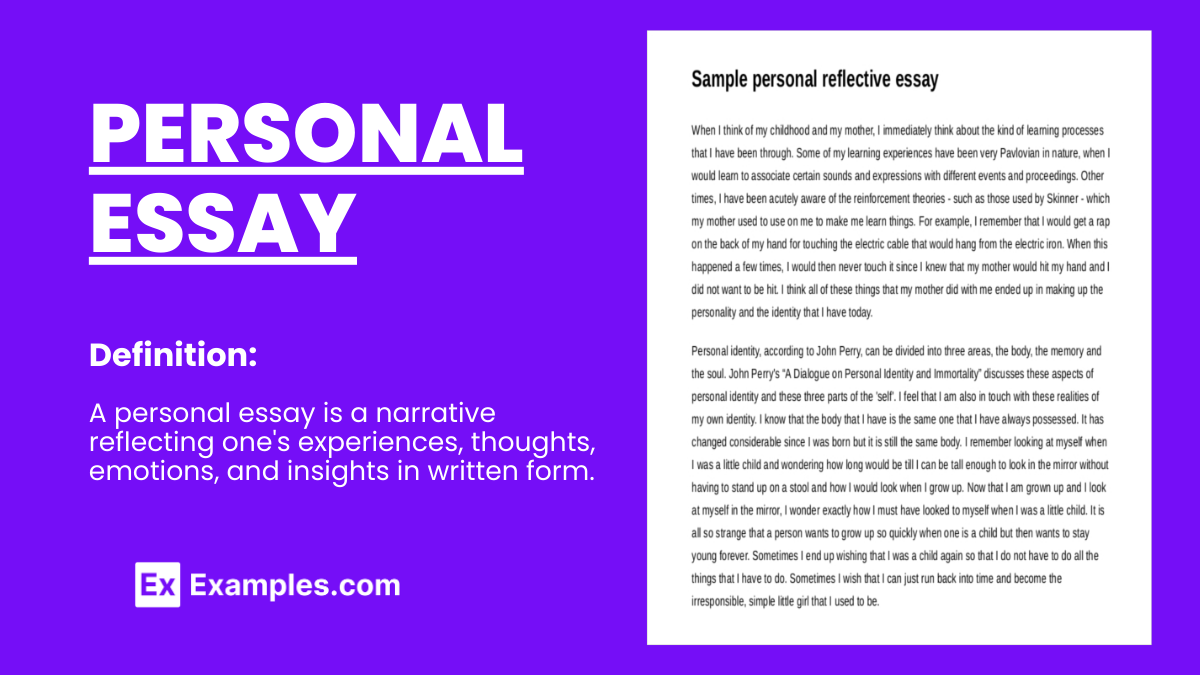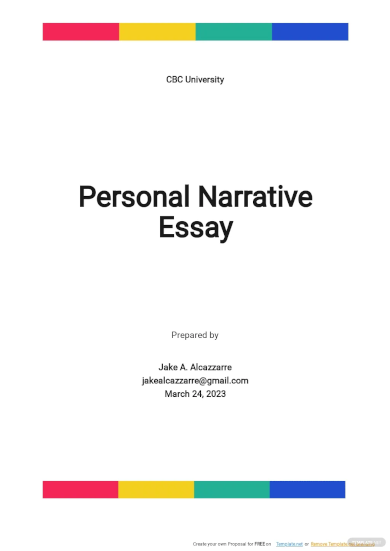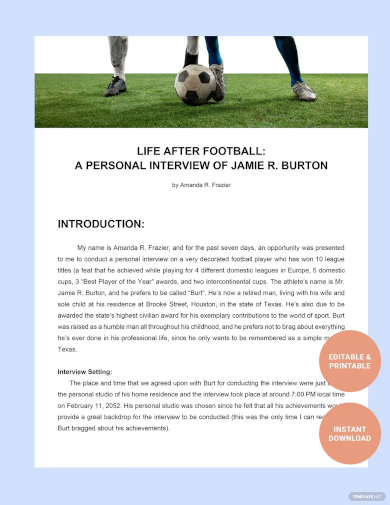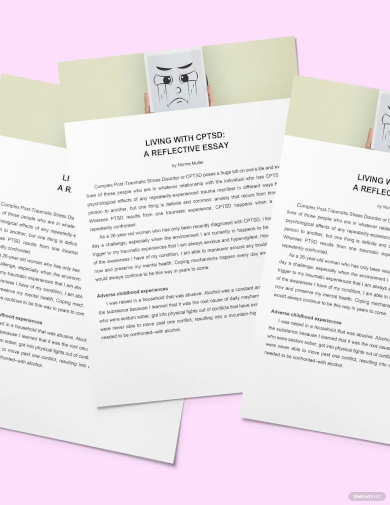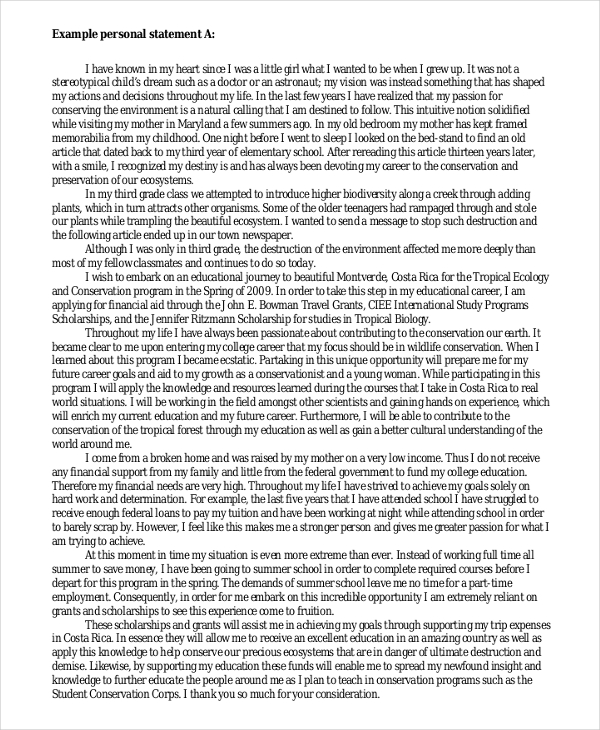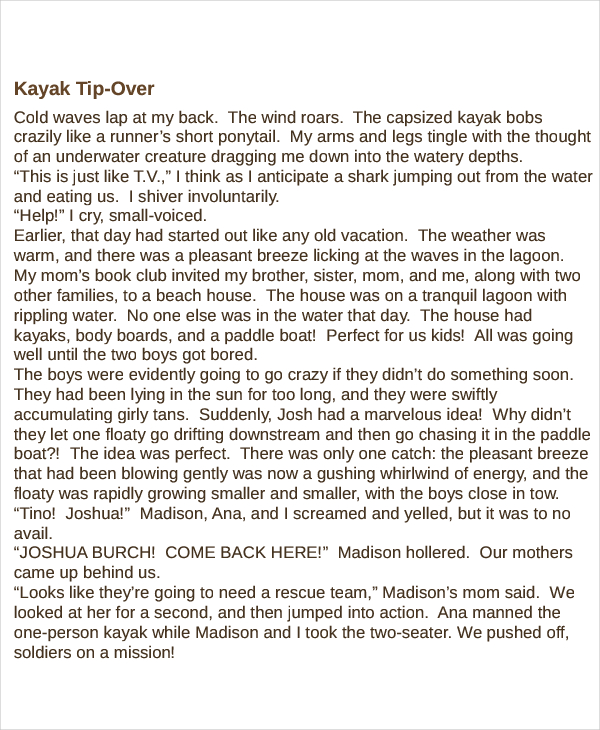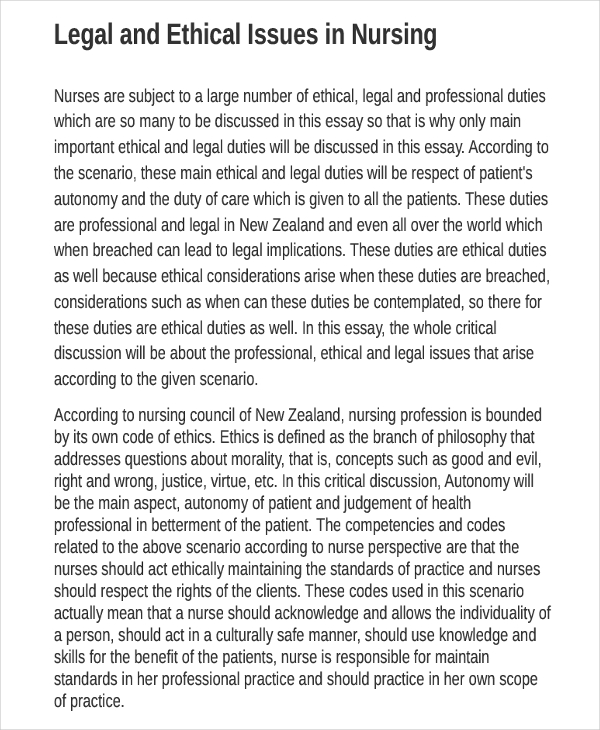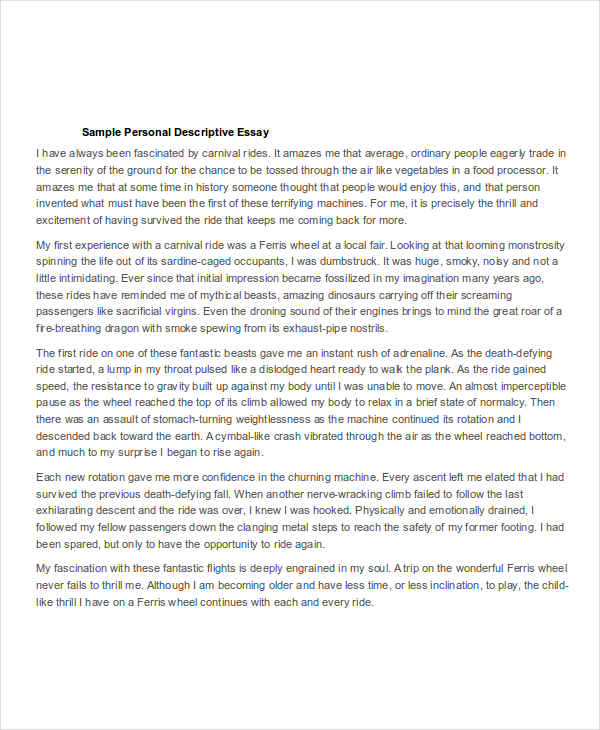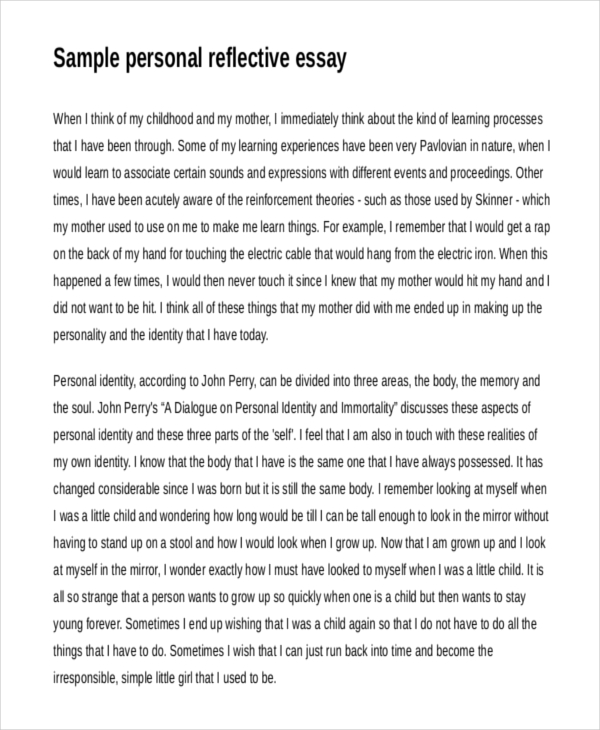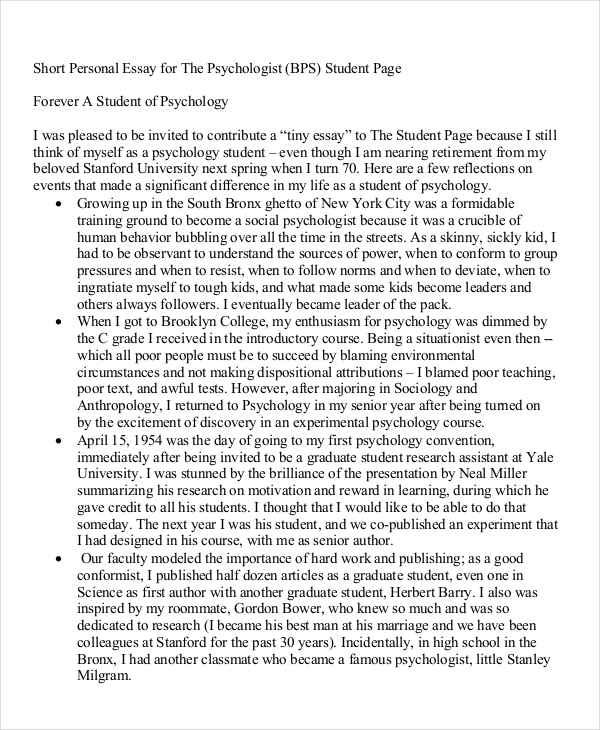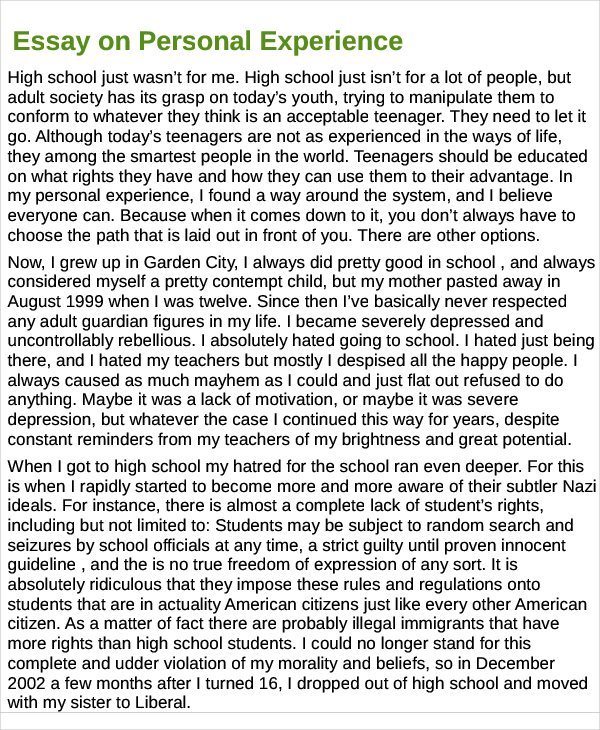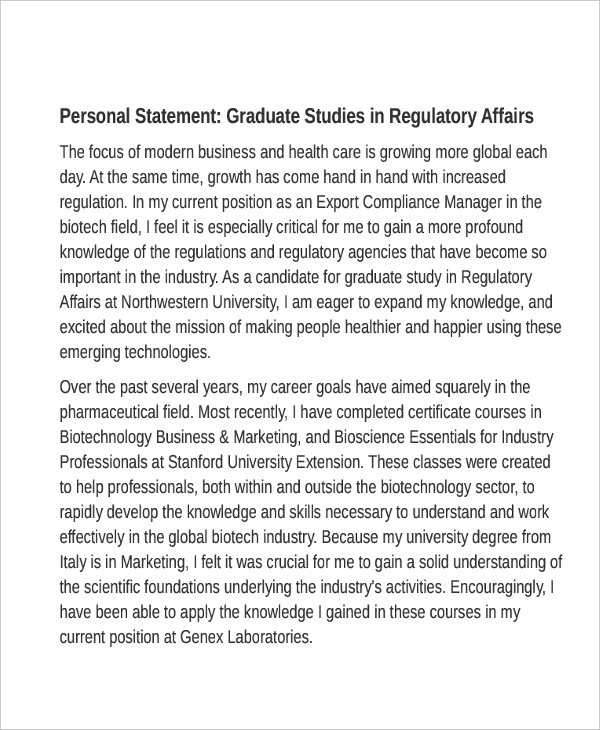10+ Personal Essay Examples to Download
Essay writing are compositions which basically includes a general idea or an in depth discussion of a particular subjects or topics. They are commonly written as non-fictional pieces which carry the writer’s point of view on a certain topic of his/her choice or interest.
In schools, teachers often assign students how to write an essay composition about different topics, usually in order to assess their writing skills. There are different essay types, which can be written using the standard structure (introduction, body, and conclusion), and through different writing styles.
What Is a Personal Essay?
A personal essay, in the broadest sense, is a written composition which contains information and personal opinions about a specific individual (usually famous and influential individuals). It is one of the most common essays given as an assignment to students of different levels. In some cases, a personal essay (at times known as a personal statement) may include the writer’s personal information, as a requirement for an application. They may be used as basis whether to grant an individual’s application or not.
Personal Essay Format
Introduction
- Hook: Begin with a compelling sentence to grab the reader’s attention. This could be an intriguing question, a surprising fact, or a bold statement related to your story.
- Background Information: Provide some context to your story. This might include the setting, the circumstances leading up to your narrative, or key characters involved.
- Thesis Statement: Conclude the introduction with a clear thesis statement that presents the main theme or lesson of your essay.
Body Paragraphs
Each paragraph should focus on a single idea that supports your thesis. Use the following structure for each body paragraph:
- Topic Sentence: Start with a sentence that introduces the main idea of the paragraph.
- Evidence and Examples: Use personal experiences, anecdotes, or reflections to support your point. Be descriptive to help the reader visualize and feel your experiences.
- Analysis: Explain how these examples support your thesis. Connect your personal story to larger themes or universal truths.
- Transition: End with a sentence that smoothly transitions to the next paragraph.
Conclusion
- Summary: Begin your conclusion by restating your thesis in a new way, summarizing the key points you made in your essay.
- Reflection: Share what you’ve learned from your experiences. Reflect on the growth or change that occurred as a result.
- Closing Thought: End with a final thought or call to action that leaves a lasting impression on the reader. This could be a question, a prediction, a hope, or a call to personal reflection.
Example of Personal Essay
Free Download in Word Free Download in PDFMy Journey Through Silence: Finding My Voice
It was in the quietest moments that I discovered the loudest parts of myself. Growing up with a stutter, I navigated a world that often felt like it was designed for everyone but me. Conversations were minefields, and every word was a battle. Yet, it was through this journey of silence and struggle that I found my true voice, not just as a speaker, but as a person with something valuable to say.
My stutter was more than a speech impediment; it was a barrier to my identity. In school, I avoided speaking at all costs. Presentations were nightmares, and group discussions were silent movies in which I played the mute protagonist. This silence, however, became my loudest cry for self-expression. I turned to writing, where words flowed unimpeded. Writing became my refuge, but it also set the stage for a greater transformation.
The turning point came when I was asked to write a speech for a community event. Faced with the daunting task of not only writing but delivering it, I felt the familiar cloak of fear. But the message I wanted to share was louder than my fears. Standing on that stage, stuttering yet undeterred, I realized my voice’s power didn’t come from its fluency but from the truth it carried. That moment marked the beginning of a new chapter in my life.
The journey from silence to expression taught me the value of listening. I learned to listen not only to the words of others but to the unspoken messages in their pauses, their breaths, and their eyes. This deepened empathy and understanding fueled my desire to advocate for those who, like me, struggled to be heard. My personal battle had evolved into a broader mission.
My stutter, once a source of shame, became my greatest teacher. It taught me the power of perseverance, the art of listening, and the value of voice. I’ve learned that our imperfections are not limitations but invitations to find unique paths to self-expression. In finding my voice, I discovered that the most profound conversations often start in silence. And it is in embracing our vulnerabilities that we find our true strength.
This journey of overcoming, learning, and ultimately embracing my stutter has not only shaped my identity but has also shown me the universal power of resilience and the beauty of human connection through vulnerability.
Personal Essay for Students
Free Download in Word Free Download in PDFEmbracing Change: My First Year in High School
Starting high school was a monumental change in my life. It was a blend of excitement and anxiety, stepping into a world that seemed so vast and unknown. I had always heard that high school was where you found yourself, where lifelong friendships were formed, and where the future started to take shape. My journey through the first year of high school taught me about adaptability, resilience, and discovering my own path.
The summer before high school, I oscillated between dreaming about the independence it would bring and fearing the challenges of new academic pressures and social dynamics. The thought of navigating a larger school with students from different backgrounds and the pressure to perform well academically loomed large. Yet, there was this underlying current of excitement about joining clubs, exploring new subjects, and the chance to redefine myself.
The first day was a whirlwind of emotions. The hallways were bustling with students, and the air was thick with anticipation. I remember feeling like a small fish in a big pond, surrounded by unfamiliar faces and the daunting task of finding my classrooms. It was overwhelming, but there was a sense of adventure in not knowing what each day would bring.
Adapting to the academic rigor of high school was challenging. The workload was heavier, and the expectations were higher than I was accustomed to. I learned the hard way that procrastination was my enemy. Balancing homework, extracurricular activities, and personal time became a juggling act. It was during these times that I discovered the importance of time management and setting priorities. I also learned to ask for help when I needed it, whether it was from teachers or classmates, which was a humbling and educational experience in itself.
Socially, high school was a maze. Finding where I fit in was not immediate or easy. I joined clubs and sports teams to meet people with similar interests, which helped me form friendships. Some of these friendships fizzled out, while others grew stronger, teaching me about the qualities I valued in friendships and in myself. It was a time of self-discovery, of figuring out my interests, beliefs, and values.
One of the most significant lessons from my first year was learning to embrace change. Change was constant, whether it was adapting to new teachers’ styles, the evolving dynamics of friendships, or my own personal growth. I learned that change wasn’t something to fear but to embrace as an opportunity for growth. It taught me resilience, the ability to bounce back from setbacks and to keep moving forward, even when things didn’t go as planned.
Reflecting on my first year of high school, I realize it was a year of growth, challenges, and invaluable lessons. It was the beginning of understanding who I am and who I want to become. High school is a journey of transformation, and my first year laid the foundation for the rest of my high school experience. It taught me that while change is inevitable, how I respond to it is within my control. This realization has empowered me to face the future with optimism and an open heart, ready for whatever comes my way.
Personal Essay about Yourself
Free Download in Word Free Download in PDFA Tapestry of Memories: My Story
Life, in its essence, is a collection of moments, each thread in the tapestry of our existence weaving a unique story. My story is one of resilience, curiosity, and the relentless pursuit of passion, marked by moments of triumph and trials that have shaped me into who I am today.
Born into a family that valued education and hard work above all, I was taught from a young age that the pursuit of knowledge was not just a journey but a responsibility. My childhood was filled with books and the encouragement to question, explore, and dream. This instilled in me a deep-seated love for learning, whether it was understanding the mechanics behind a toy car or unraveling the mysteries of the stars. My parents, my first and forever teachers, nurtured this curiosity, teaching me that every question had an answer and every problem a solution.
However, life has its way of testing our mettle. During my teenage years, I faced a significant health challenge that threatened to derail my academic and personal life. Days in the hospital and long periods of recovery became my routine, turning my world upside down. This period was a crucible, testing my resilience and forcing me to find strength I never knew I had. It was a stark reminder of the fragility of life but also a powerful lesson in perseverance. I learned to adapt, to find joy in the smallest of victories, and to keep moving forward, even when the path was obscured by uncertainty.
My passion for learning transformed into a love for writing as I navigated through these trials. Writing became my solace, a way to express the whirlwind of emotions and to document my journey through recovery. It was through this medium that I discovered my voice and the power of storytelling. Writing allowed me to step outside my circumstances and to see my story as part of a larger narrative of hope and resilience. It became a catalyst for my recovery, offering a sense of purpose and direction.
As I emerged from this challenging chapter, my perspective on life had irrevocably changed. I realized that our experiences, both good and bad, are not just isolated incidents but stepping stones in our journey of personal growth. This realization fueled my desire to make a difference, to use my experiences and my voice to inspire others facing their own battles.
Today, I stand as a testament to the power of resilience, the importance of curiosity, and the strength found in vulnerability. My journey has taught me that while we cannot control every aspect of our lives, we can choose how we respond to the challenges we face. I have chosen to face mine with optimism, courage, and an unwavering commitment to growth.
In sharing my story, I hope to light a spark in others, to encourage them to embrace their own journeys with courage and to remind them that they are not alone in their struggles. Life is an intricate tapestry of memories, and each of us has a unique story to tell. My story is one of countless threads in the vast tapestry of human experience, a reminder that our stories, in all their complexity and beauty, are what truly make us who we are.
Personal Essay Ideas & Topics with Samples to Edit & Download
- How do you handle fear
- My best friend essay
- My hobbies
- The impact of family traditions
- A place you try to avoid
- An event that changed your life
- Childhood memories
- Describe a person you admire
- Had a Dream Come True
- How do you make hard decisions
- The best moment of your life
- What is a book you love
- Your bravest moment
- A row with my peers
- The best moment of your life
- What makes you proud
Personal Essay Examples & Templates
Personal Narrative Essay Template
Personal Interview Essay Template
Personal Reflective Essay Template
Scholarship Personal Sample
Personal Narrative
Nursing Essay Example
Personal Descriptive
Personal Reflective Example
Short Personal Essay
Personal Experience
Statement Essay Sample
Importance of a Personal Essay
Essays, in general, covers different topics. A personal essay may discuss about prominent people or the writer himself/herself. Like other essays, a personal essay is basically written to inform the readers. You may also see tips for writing an effective essay.
Writing a conclusion for essay helps a writer practice the expression of personal opinion. It also helps in improving the writer’s skill in communicating with the readers. Because a personal essay is a mixture of facts and opinions on a particular matter, the readers may be able to learn about such topic while at the same time learning about the writer’s opinion.
In an application writing, a personal essay can help an individual inform the admission committee about his/her qualifications for a certain job or school admission.
How to Write Personal Essay
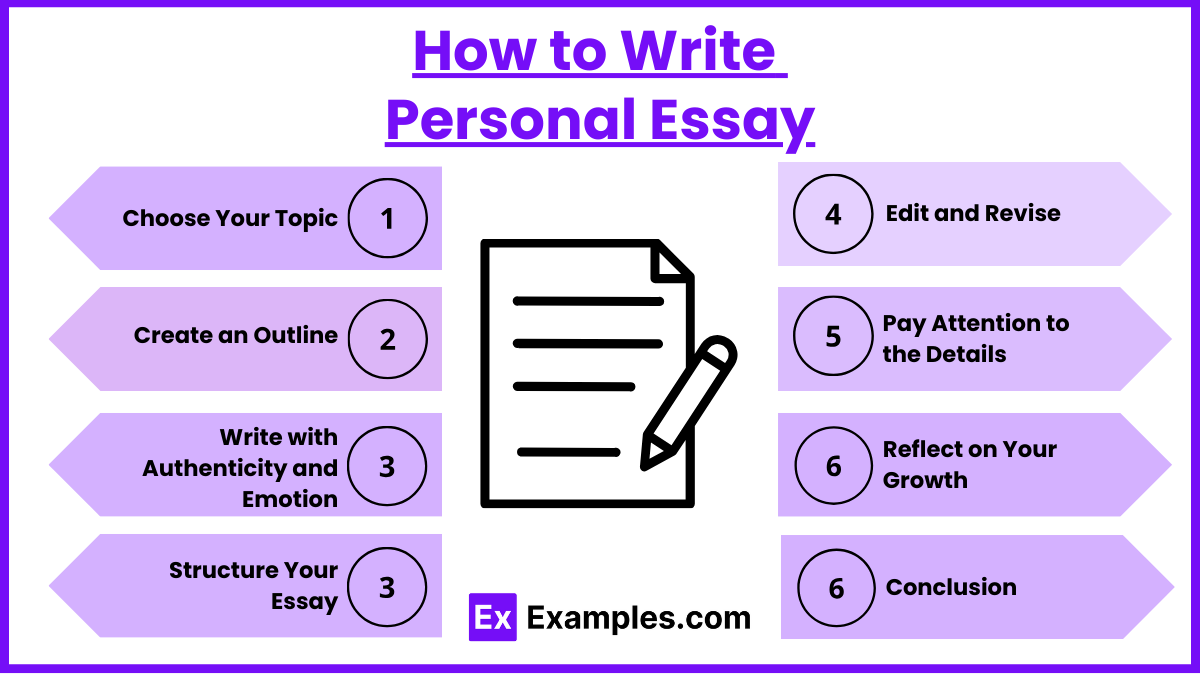
Writing a personal essay is a journey into your own experiences, emotions, and insights. It’s an opportunity to share your story, reflect on your life’s events, and express your unique perspective. Here’s a comprehensive guide to crafting a compelling personal essay.
1. Choose Your Topic
- Reflect on Your Experiences: Think about moments in your life that have shaped who you are. These can be milestones, challenges, triumphs, or even everyday occurrences that hold special meaning.
- Identify Your Message: Determine the insight or message you want to convey through your story. What do you want the reader to learn or feel?
2. Create an Outline
- Introduction: Start with a hook to grab the reader’s attention, followed by a brief overview of the story you will tell. Conclude with a thesis statement that encapsulates the main theme of your essay.
- Body Paragraphs: Outline each paragraph with a main idea that supports your thesis. Include specific details, experiences, and reflections.
- Conclusion: Plan to tie your narrative together, restate your thesis in a new light, and leave the reader with something to think about.
3. Write with Authenticity and Emotion
- Be Honest: Authenticity resonates with readers. Share your true thoughts, feelings, and experiences.
- Show, Don’t Tell: Use descriptive language to show the reader what happened and how it affected you. Include sensory details to bring your story to life.
4. Structure Your Essay
- Introduction: Begin with an engaging hook. Provide background information and introduce the central theme or question of your essay.
- Body Paragraphs: Each paragraph should focus on a specific event or aspect of your story. Use transitions to smoothly connect ideas and maintain flow.
- Conclusion: Reflect on the story and its implications. Highlight how the experiences have shaped you or changed your perspective.
5. Edit and Revise
- Take a Break: After writing your first draft, take some time away from it. This will help you return with a fresh perspective.
- Read Aloud: Reading your essay out loud can help you catch awkward phrasing and grammatical errors.
- Seek Feedback: Share your essay with trusted friends or mentors. Constructive feedback can offer new insights and help improve your writing.
- Revise: Focus on clarity, coherence, and conciseness. Ensure each sentence serves a purpose and supports your thesis.
6. Pay Attention to the Details
- Follow Guidelines: If you’re writing for a specific purpose (like a college application), make sure to follow any given instructions or word limits.
- Check Grammar and Spelling: Use tools or have someone proofread your essay to catch any mistakes.
7. Reflect on Your Growth
A personal essay is not just about recounting events; it’s about showing how those events have led to personal growth or a change in perspective. Reflect on what you’ve learned and how you’ve changed.
8. Conclusion
Writing a personal essay is an opportunity to delve into your own story and share it with the world. It requires introspection, honesty, and a willingness to be vulnerable. By following these steps, you can craft an essay that not only tells your story but also touches the hearts and minds of your readers. Remember, the most powerful essays come from a place of truth and a desire to communicate genuinely.
What are the Essential Elements of Personal Essay
1. A Clear Theme or Thesis
- Every personal essay should have a central theme or thesis that guides the narrative. This theme is the essay’s underlying message or insight that you wish to convey to your readers. It should be evident throughout the essay, providing coherence and unity to your story.
2. A Strong Opening
- The opening of your essay should immediately engage the reader. It can be a provocative question, a striking anecdote, a vivid description, or an intriguing statement. The goal is to pique the reader’s interest and set the tone for the rest of the essay.
3. Personal Experience and Anecdotes
- The heart of a personal essay lies in the author’s experiences. Detailed anecdotes and personal stories not only make the essay relatable but also help to illustrate the essay’s main theme. These narratives should be vivid, descriptive, and emotive, allowing readers to see through the author’s eyes.
4. Authentic Voice
- A personal essay should reflect the unique voice and personality of the author. It’s an opportunity to express yourself in a personal and intimate manner. Your voice should be consistent throughout the essay, giving readers a sense of who you are.
5. Reflective Insight
- Beyond narrating events, a personal essay should delve into what these experiences mean to the author. It involves analyzing events, drawing lessons, and reflecting on the impact these have had on your life or perspective. This reflective insight differentiates a personal essay from mere storytelling.
6. Emotional Resonance
- Emotional resonance helps to connect with the reader on a deeper level. By sharing feelings, vulnerabilities, and personal struggles, you invite the reader into your world. The ability to evoke empathy or emotional response is a powerful tool in personal essays.
7. A Thoughtful Conclusion
- The conclusion of a personal essay should not only wrap up the narrative but also leave the reader with something to ponder. It could be a reflection on the journey, insights gained, or questions raised by the essay. A strong conclusion reinforces the essay’s theme and echoes the emotional or intellectual impact of your story.
8. Clear, Concise Language
- While personal essays are expressive, they also benefit from clear, concise language. Avoid overly complex sentences or unnecessary jargon. The goal is to communicate your story and insights in an accessible and engaging manner.
9. Craftsmanship in Writing
- Attention to the craft of writing—such as the use of vivid imagery, metaphorical language, and a well-structured narrative—can significantly enhance the impact of a personal essay. It’s not just what you say but how you say it that matters.
Tips and Guidelines in Writing a Personal Essay
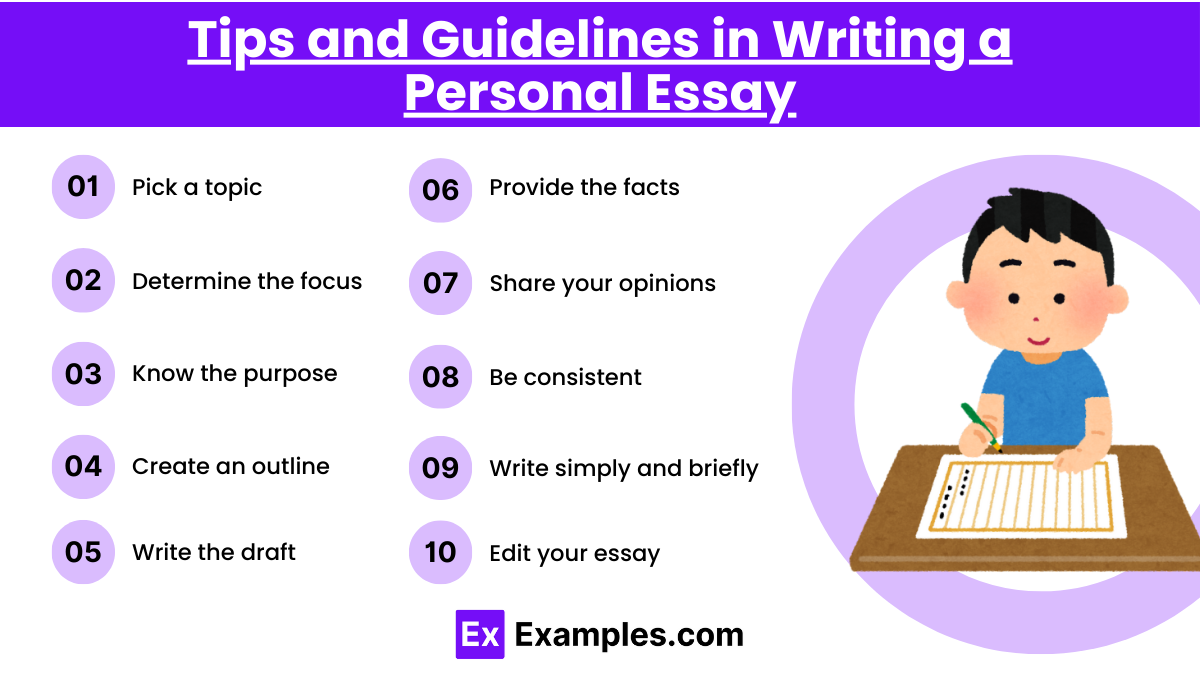
A personal essay can be written for different purposes. An effectively written personal essay has the ability to inform the readers, while at the same time, inspiring them. In writing a personal essay (or essay examples in doc), a writer must keep the following things in mind.
1. Pick a topic.
Choose a topic that is both timely and significant in your area. Your life story can also be considered as a great topic in writing your personal essay. You may also see personal essay examples & samples.
2. Determine the focus.
You cannot cover everything, so find an angle which you can focus on.
3. Know the purpose.
See if you can satisfy your purpose in writing your composition.
4. Create an outline.
Essay Outlines provide a better division and organization of ideas. This gives the writer a direction on what to focus on.
5. Write the draft.
With a draft, you will be able to write without hesitations or restrictions.
6. Provide the facts.
Research on the topic you want to write about and provide the facts. You may also like samples of formal essays.
7. Share your opinions.
Share what you think about the topic.
8. Be consistent.
Remain focused on your topic throughout your whole composition.
9. Write simply and briefly.
Using simple language will enable you to explain your topic clearly, at the same time helping you to effectively shorten your sentences and paragraph. You may also check out analytical essay examples & samples.
10. Edit your essay.
Improve your short essay by rechecking and reviewing for errors.


